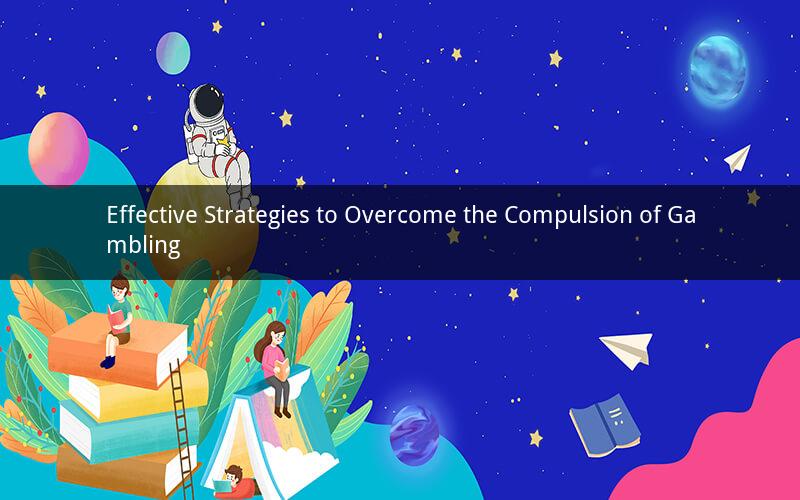
Introduction:
Gambling has become a widespread issue affecting individuals from all walks of life. The allure of potential wealth and the thrill of the game often lead to uncontrollable gambling habits. However, breaking free from this detrimental addiction is crucial for one's well-being. In this article, we will explore effective strategies to overcome the gambling habit and regain control over one's life.
1. Recognize the Problem:
The first step in overcoming any addiction is to acknowledge its existence. Identifying the signs and symptoms of gambling addiction is essential. Common indicators include preoccupation with gambling, neglecting responsibilities, borrowing money, and experiencing emotional and financial distress.
2. Seek Professional Help:
Professional help is invaluable in overcoming a gambling addiction. Therapists, counselors, and addiction specialists can provide personalized guidance and support. They can help individuals understand the underlying causes of their addiction and develop effective coping strategies.
3. Establish a Support System:
Surrounding oneself with a supportive network is crucial for recovery. This can include family members, friends, or support groups specifically designed for individuals struggling with gambling addiction. Sharing experiences and receiving encouragement from others who have faced similar challenges can be immensely beneficial.
4. Develop Financial Strategies:
Financial management plays a vital role in breaking the gambling habit. It is essential to create a budget and stick to it. Setting limits on spending and avoiding credit cards can prevent further financial strain. Additionally, seeking financial counseling can provide valuable insights into managing debts and improving financial stability.
5. Replace Gambling with Healthy Alternatives:
Finding alternative activities to replace gambling is essential for long-term recovery. Engaging in hobbies, exercise, and socializing with friends and family can provide a sense of fulfillment and distract from the urge to gamble. Participating in community events or joining clubs can also help build a support network and provide a positive outlet for leisure.
6. Set Clear Goals:
Establishing clear and achievable goals can serve as a motivator throughout the recovery process. These goals should be specific, measurable, attainable, relevant, and time-bound (SMART). Examples include attending therapy sessions regularly, avoiding gambling triggers, and maintaining a healthy lifestyle.
7. Practice Self-Reflection:
Regular self-reflection can help individuals gain insight into their thoughts and behaviors. Keeping a journal to track progress, triggers, and emotions can be a valuable tool. Reflecting on past experiences and identifying patterns can assist in developing strategies to prevent relapse.
8. Stay Positive and Patient:
Overcoming a gambling addiction is a challenging process that requires time and effort. It is crucial to maintain a positive mindset and be patient with oneself. Celebrate small victories and acknowledge progress, no matter how small. Remember that setbacks are a part of the journey, and it is essential to learn from them and continue moving forward.
9. Avoid Triggers:
Identifying and avoiding triggers is essential in maintaining sobriety. Triggers can vary from person to person, but common examples include gambling venues, certain social situations, or even specific websites or advertisements. Creating a trigger-free environment can significantly reduce the temptation to gamble.
10. Continuously Seek Support:
Recovery is an ongoing process, and seeking support is crucial. Attending support groups, joining online forums, or connecting with a mentor can provide ongoing guidance and encouragement. It is important to remember that support is available whenever needed.
Questions and Answers:
1. How can I recognize if I have a gambling addiction?
Answer: Look for signs such as preoccupation with gambling, neglecting responsibilities, borrowing money, and experiencing emotional and financial distress. If you find yourself struggling to control your gambling habits, it may be an indication of addiction.
2. Can therapy help in overcoming a gambling addiction?
Answer: Yes, therapy can be highly effective in overcoming a gambling addiction. Therapists can provide personalized guidance, help individuals understand the underlying causes of their addiction, and develop effective coping strategies.
3. What are some healthy alternatives to gambling?
Answer: Engaging in hobbies, exercise, socializing with friends and family, participating in community events, and joining clubs are some healthy alternatives to gambling. These activities can provide fulfillment and distract from the urge to gamble.
4. How can I create a trigger-free environment?
Answer: Identify your gambling triggers and take steps to avoid them. This may involve staying away from gambling venues, blocking gambling websites, and avoiding certain social situations that may trigger the urge to gamble.
5. Is it possible to overcome a gambling addiction on my own?
Answer: While some individuals may find success in overcoming a gambling addiction on their own, seeking professional help and joining support groups can significantly enhance the recovery process. The guidance and support provided by professionals and fellow addicts can be invaluable in maintaining sobriety.